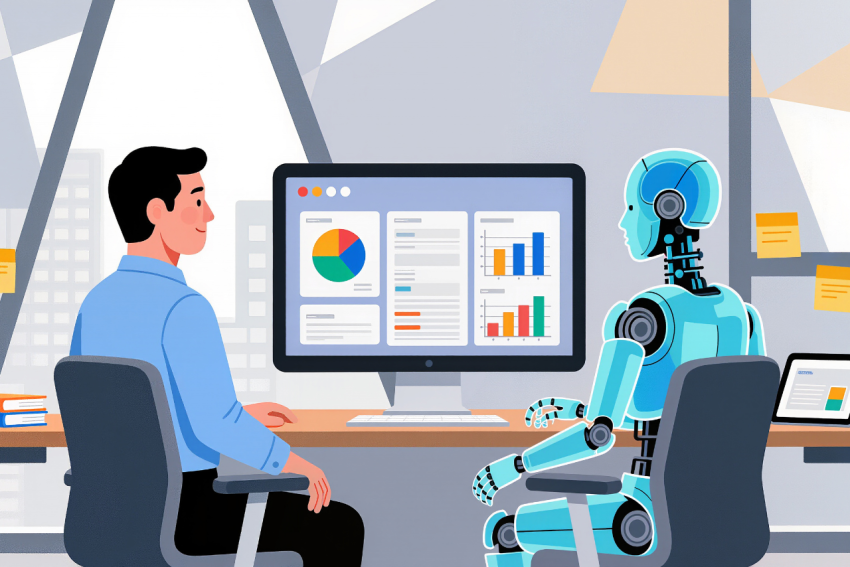AI translation rates: what to expect from a professional agency

Artificial intelligence is changing the way professional agencies handle their translation workflows. Unlike simple machine translation via DeepL or Google Translate, agencies use advanced CAT (Computer-Assisted Translation) tools that include translation memories, glossaries, and customisable neural algorithms. The aim is to boost productivity while ensuring terminological consistency.
Índice de contenidos
Index of contents
Index du contenu
Inhaltsverzeichnis
Indice dei contenuti
Machine AI vs. human-assisted AI
A fundamental distinction must be made between artificial intelligence used alone for translation and AI used alongside a human translator in a collaborative workflow. When operating independently, AI delivers quick, rough translations, processing large volumes of text in record time. However, this approach has significant limitations: contextual mistakes, word-choice errors, and stylistic awkwardness are common, especially with nuanced or specialised texts. In contrast, pairing AI with human post-editing greatly improves the quality of the translations. Professional translators lend their language skills, cultural awareness, and understanding of the client's specific requirements to polish the AI-generated text. This collaboration results in a text that is both fluent, accurate, and perfectly adapted to the tone, terminology, and subtleties of the original text. Thus, the combination of technology and human expertise provides an optimal solution for ensuring the quality and reliability of translations.
The advantages of AI
Incorporating artificial intelligence into translation processes offers multiple strategic benefits for companies. Firstly, AI tools are impressively fast, able to translate large volumes of content in record time, which is particularly useful in situations where speed really matters. Secondly, these technologies ensure linguistic consistency by maintaining uniform terminology throughout the text, which is key for preserving your brand image and keeping your message clear. Another big plus is cost savings: by storing content and recognising repeated segments, translations can be processed more efficiently, lowering language production costs.
Platforms such as TextUnited, Weglot, and Smartling already exemplify this hybrid approach, combining smart automation with human input to provide reliable, consistent, and economically efficient translation solutions.
How translation agencies put artificial intelligence to work
The best translation agencies combine multiple tools to offer a top-quality service:
They often use private neural machine translation engines, such as DeepL Pro, which can generate high-quality machine translations. These engines can be enriched with customised glossaries, which are lists of specific terms that the client wants translated in a certain way. This helps maintain consistent terminology and sector-specific vocabulary.
However, technology alone won't cut it. These agencies establish collaborative workflows, where artificial intelligence serves as a starting point. The text is then reworked by a professional translator, who adapts the style, tone, and meaning, before being reviewed by a native speaker to ensure fluency and cultural appropriateness.
A final human check is always included, even when the text has been pre-translated by AI. This step allows for the correction of any errors, harmonisation of the content, and ensures that the message is perfectly adapted to the target audience.
Thanks to this combined approach, translation agencies can offer services that are fast, accurate, and highly reliable.
Price comparison: AI alone, AI + human, human alone
The two main factors considered by clients when choosing between AI or human translation are quality and cost. Here is a quick overview of the different translation prices according to the processes involved:
| Translation Method | Typical Rates | Comments |
|---|---|---|
| Human alone (agency) | €0.10 to €0.20 / word | Translation carried out by specialised professionals, including proofreading and quality control. Ideal for technical, legal, or marketing content. |
| Human alone (standard) | €0.08 to €0.11 / word | Translation carried out by an independent or non-specialised translator. Suitable for simple or non-technical texts. |
| AI alone | From €0.002 / word | Very cost-effective, but carries risks of errors, mistranslations, or stylistic awkwardness. To be avoided for sensitive content. |
| AI + post-editing | From €0.02 / word | AI performs an initial translation, then a human corrects and improves the text. Good compromise for non-critical or internal documents. |
| AI subscriptions | €15 to €1,299 / month | Unlimited or extended access to machine translation platforms (e.g., DeepL, Weglot). Useful for companies with regular needs, such as managing multilingual websites. |
The right balance between technology and human expertise
AI helps reduce turnaround times and costs, but it is not always the most reliable solution. For sensitive content (medical, legal, marketing), human intervention remains essential. Professional translation services provide tailored support based on the client's quality needs. AI is reshaping the translation landscape, but alone, it is not enough. It is the combination of technology and human expertise that ensures translations are accurate, nuanced, and meet business expectations.
Need tailored support? Get in touch with our team to find the best approach for your needs, whether AI, post-editing, or full human translation, all based on your objectives and budget.
Other articles you may be interested in:

Assistant marketing chez Abroadlink, Djobdi SAÏDOU est actuellement en deuxième année de Master Langues Étrangères Affaires Internationales à l'Université de Lorraine. Il est également titulaire d'une licence de langues étrangères appliquées.



Add new comment